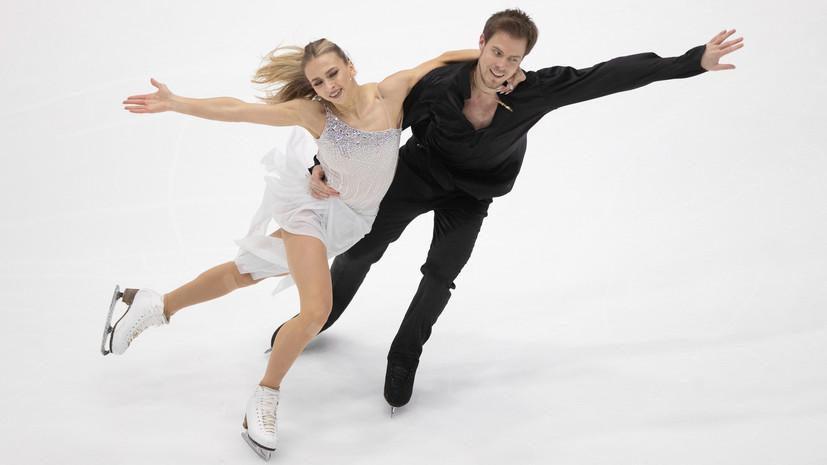In the first half of this season, everything went to the fact that the main confrontation in ice dancing would be exactly the same as two years ago. That is, it will come down to a duel between the four-time world champions Gabriela Papadakis - Guillaume Sizeron and Victoria Sinitsina - Nikita Katsalapov, who took the highest European title from the French in 2020. A year later, Russian dancers won the World Championships, but the brightness of that victory was somewhat muffled by the lack of leaders. Gabriela and Guillaume decided to skip the season due to the problems associated with the pandemic, but against the backdrop of the triumph of the Russians, I really wanted to believe that the duo's unconditional hegemony was about to end.
The reality was not too rosy.
In the Grand Prix series of this season, the French still looked preferable to anyone else, though they didn’t have a face-to-face fight with Sinitsina and Katsalapov: first, the Grand Prix final was canceled due to the pandemic, but then it became known that Papadakis and Sizeron decided to skip the continental championship in order to minimize the risk of catching the virus before the Olympics.
And who could have imagined that the current world champions would face a fierce “internal” confrontation in Tallinn with two-time Russian champions Alexandra Stepanova and Ivan Bukin?
A year ago, nothing foreshadowed such a rapid rapprochement between two Russian couples. The difference between them at the world championship was more than 12 points, and in general Sinitsina and Katsalapov looked at those competitions as representatives of a different league compared to all participants in the dance tournament. Just then a chain of small events followed, which together led to the fact that the forces of the two leading Russian couples began to level off before our eyes.
When Sinitsina and Katsalapov were preparing for the European Championships in Graz (the very one they were to win), their coach Alexander Zhulin said that the term “skating on save” appeared in the group’s everyday life: that is, do everything extremely carefully, avoiding technical errors and not allowing emotions to negatively affect the result. After the victory of the skaters in Stockholm, it was very difficult to get rid of the feeling that, having won the highest title, they continue to skate “on the save”: they are not too eager to take risks, try something new, in a word, continue to surprise with something and move forward. To this were added quite serious health problems, because of which Victoria and Nikita were forced to miss the Russian championship.
It was easier for Stepanova and Bukin already because they always had a landmark in front of their eyes and a desire to at least achieve it, and as a maximum - to surpass it.
The season for the duet of Irina Zhuk and Alexander Svinin was also not easy.
I had to fight both injuries and illnesses, but in December the skaters and their coaching staff made a very right move: they recruited two very strong dance specialists, Nikolai Morozov and Alexei Gorshkov, to work.
Perhaps, just because of this, both the short and free dances of the couple sparkled with new colors.
The fact that in Tallinn the difference between the two rhythm dance duets was only 1.44 points spoke for itself.
Another reason for the progress of the second Russian couple could be considered the fact that over the past seasons Sasha and Ivan have constantly lost to someone. And constantly racked their brains, due to which they can become better. Sinitsina and Katsalapov found themselves in a much more difficult situation in this regard: together with the coaches, they spent so much effort to catch up with the French and surpass them that they absolutely objectively needed to take a breath. Perhaps this is precisely why the free dance of the Olympic season turned out to be Zhulin, the director, not his most striking work. Vika and Nikita avoided direct comparison with their main rivals by withdrawing from the national championship after the rhythm dance, but even without that it was clear that the rivalry between the duets at the European championship could turn out to be more than tight.
That's how it all happened.
Stepanova and Bukin once again perfectly coped with the rental and fulfilled their main task - they confidently outperformed the Italians Charlene Gignard - Marco Fabbri.
In the confrontation with the world champions, they remained second, losing just a little bit in each of the components: in the basic complexity of the dance (they lost the level in the track on one leg) and in points for the components, where Sinitsina and Katsalapov had five “tens”.
The final advantage of the world champions in the free dance was 3.32 points, but opinions within the judging panel were divided: according to the French and English arbitrators, Stepanova and Bukin performed their dance better than the champions and fully deserved to be the first.
If you do not get into the technical jungle, we can state briefly: three weeks before the Olympic Games, Russia has two equivalent pairs, each of which is capable of becoming an ornament of a team tournament.
Yes, personal too.

